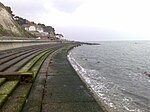Wheelers Bay
Bays of the Isle of WightUse British English from June 2015

Wheelers Bay is a small bay on the south-east coast of the Isle of Wight, England. It lies to the east of Ventnor. It faces south-east towards the English Channel, its shoreline is 300 yards (270 m) in length. A 90-yard (82 m) section of the bay, to the side of the slipway, is used as dry-storage for boats; in recent years this has been targeted by thieves. The bay is home to an open-air café known as The Seapot. The bay is accessed by a concrete slope from the road above the bay or by walking along the seawall either from Ventnor or Horseshoe Bay. The Isle of Wight Coastal Path runs the length of the bay along the seawall.
Excerpt from the Wikipedia article Wheelers Bay (License: CC BY-SA 3.0, Authors, Images).Wheelers Bay
Kings Bay Road,
Geographical coordinates (GPS) Address Nearby Places Show on map
Geographical coordinates (GPS)
| Latitude | Longitude |
|---|---|
| N 50.59443 ° | E -1.19588 ° |
Address
Kings Bay Road
PO38 1QR
England, United Kingdom
Open on Google Maps










